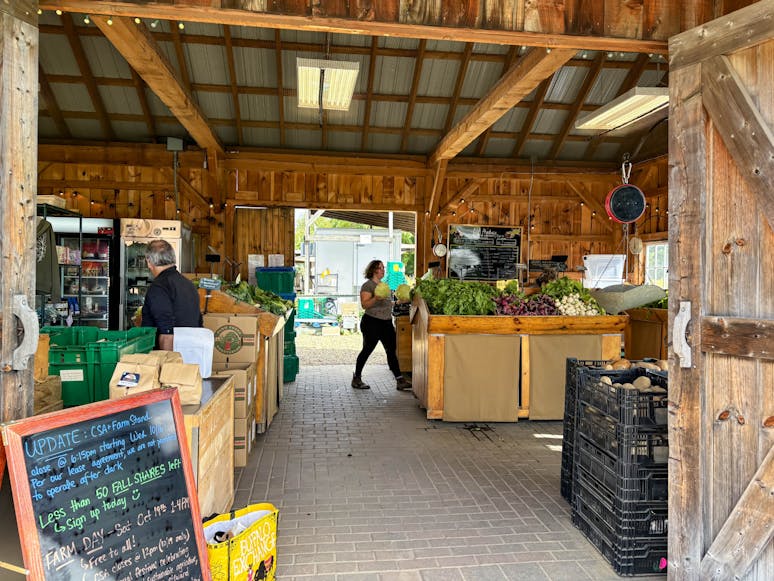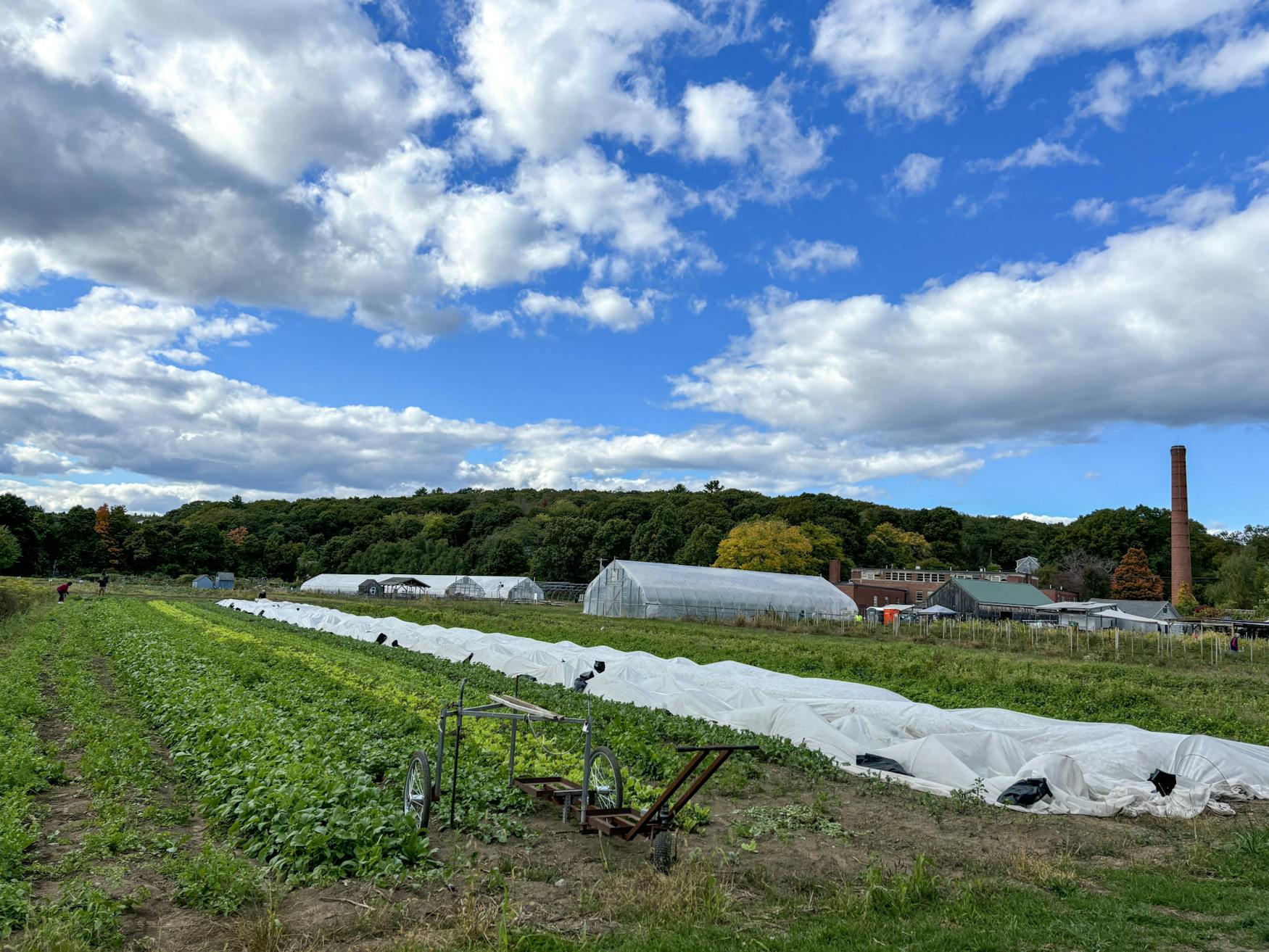Nadine Dyskant-Miller: An aspiring Waltham farmer
A young woman’s labor of love.
Content warning — This article contains mention of suicide.
Nadine Dyskant-Miller is a soft spoken woman. She wore a drooping sun hat and a kind smile as she walked me through plastic wrapped green houses filled with warmth and tomatoes. The air smelled of autumn and fall hues decorated the treeline. My back to the fields as we chatted, Nadine gazed from my eyes to the crops behind me. The organic farm was sprinkled with barren beds and picked over vegetables waiting to be disked into the earth. The greenhouse tables were without the thousands of sprouting seedlings that once covered their tops, instead there sat crates of old garlic ready to be broken into cloves. The last of the Zinnias were vibrant but pedals dropped to the dry dirt below and soon they will be gone. The farm is transitioning, a transition that resembles a carcass.
Nadine began working at Waltham Fields Community Farm as an assistant grower in 2020. She was lured by their mission statement:
“Waltham Fields Community Farm cultivates sustainable and equitable relationships between people, their food supply, and the land from which it grows. We envision communities with equitable access to the beauty, sanctuary, and food of local, sustainable farms.”
Nadine has remained because this mission rings true.
In the last three years she has taken over as assistant farm manager. In this role Nadine oversees hiring for the farm crew, field crop planning, the spring seedling sale and general maintenance of the operation. “Nadine is a driving force for the farm who ensures that everyone feels welcome,” her coworker Marina Vergara said on Oct. 11. Nadine surprised Marina with freshly baked banana chocolate chip muffins for her first day at the farm. This is not an uncommon occurrence. The farm is an echo chamber of praise for Nadine. No one could say her name without adding that she is, “a fantastic human being and excellent farmer.”
The country needs young, excellent farmers like Nadine. Agriculture in the United States is an aging industry. According to the U.S. Department of Agriculture’s census report, the average age of farmers has been steadily increasing since 1978 when the median age was 50. The average age today is nearly 60 years old. Agriculture is in need of fresh faces to replenish the crop of farmers. Young people who are eager and bring new perspectives. Young people like Nadine.
Nadine hopes to deliver. She wants to start her own small farm one day. Maybe near the District of Columbia as that is where her family has settled down. A one-acre plot in Virginia that produces herbs and veggies and maybe a few chickens. Her farm would bring the community together and provide fresh produce to those who cannot afford or do not have access to such rich nutrients. I picture her composing sustainable living like music, ebbing and flowing with the land and seasons in harmony.
Nadine’s journey to becoming a farmer will not be an easy one. Many young farmers face back-breaking, soul-aching labor that may leave them with nothing but debt and bitterness.
Young farmers are hard to come by. Just 9% of farmers were under the age of 35 in 2022’s census. It is exceedingly more difficult for those without a familial background in the industry. Family-owned farms make up 97% of agriculture in the U.S., with 50% of the land those farmers use being passed on from generation to generation. Meaning, those who begin with roots in the industry have an advantage in almost every regard.
Nadine is 33 and spent much of her childhood in the suburbs of western New York. Her family never had a garden, let alone a generational accumulation of land. On Oct. 9, she told me that for most of her life “farming was never something I considered.” She grew up homeschooled with her two older brothers. While her father was away working as an engineer, her mother stayed home and instilled in Nadine a talent and passion for music. Nadine began playing the flute — among other instruments — and never stopped. She continued her education at the University of Michigan where she received a Bachelor’s in Music with Honors in 2015. It was a composition professor who turned her onto farming by assigning works by Wendell Berry, a poet, novelist, environmental activist and farmer. Nadine is entering farming with a clean slate which leaves her behind seasoned growers but also gives her fresh perspective.

Young farmers often struggle with buying or leasing land, especially those with student debt that leaves them unqualified for loans. In a survey taken by over 10,000 aspiring young farmers, access to land was their greatest obstacle with 59% calling the struggle “extremely challenging.” If a farmer is able to get the land and money necessary to be operational, then comes the steep learning curve that even farmers who have been working for decades struggle with. Young people are inexperienced and failure of a crop due to an ignorant mistake can lead to total business failure. These obstacles lead to stress and mental health instability, huge factors in the farming community that are consistently overlooked. Farmers are 3.5 times more likely to commit suicide than the average person. The mind is not the only part of a farmer taking a beating. The U.S. Bureau of Labor Statistics ranks farming the highest risk for occupational injuries with 19.5 deaths per 100,000 farmers. The world is not what it once was and even generational knowledge cannot prepare a farmer for climate change. With the weather unpredictable, so is a farmer’s yield and therefore profit. A study done in 2023 reported that in the last two years, one in six farmers have found that their profit has gone down 25% due to unforeseen climate changes. All these factors considered, starting a farm looks like a pipedream meant to live in the “what ifs” of one’s youth.
Wendell Berry — the man who inspired Nadine — once said about farmers’ perseverance in the face of hardship, “Love. They must do it for love. Farmers farm for the love of farming. They love to watch and nurture the growth of plants. They love to live in the presence of animals. They love to work outdoors. They love the weather, maybe even when it is making them miserable. They love to live where they work and to work where they live.”
Farming is a passion that infiltrated Nadine’s life like a prowling vine. It climbed into her music, travel habits and the way she views the world as a whole. After college she worked on several small herb and vegetable farms throughout the Northeast. She moved to Chicago to make music and art, but ended up working in a garden center and surrounded herself with house plants.
Nadine tells me about spraying struggling plants, “You are walking slowly and staring down at the saddest of the crops and when you are doing that everything is doing terribly. It is heavy. The hard work, the labor, the life in your hands. The produce that is meant to feed households and provide your income is wilting and hanging low to the dry dirt, visibly ill.” She then says, “But then you look up and no, it’s actually just this one bit. That’s why I’m here, because it’s doing terribly.” The love Wendell Berry speaks of is inherent in Nadine, natural and genuine. She is dirty when she speaks to me — tired after a long morning of harvesting kale and fixing irrigation systems — but she is bright. Bright with a blush of young love which ignites hope.
Nadine is not ignorant of the obstacles facing young farmers. She’s watched unforeseen frosts and heat waves wipe out crops. She worries about the economic stability of sustainable agriculture in a society that favors productivity. She knows about the ever increasing cost of land and the overhead that comes with starting a farm. She has a wise amount of caution and tells me, “A lot can be said for working on an already established farm.” But she isn’t deterred.
This resilience comes from the communities Nadine has placed herself in. She has been surrounded by young farmers in most of her work. Wonderful people who fill her with enthusiasm and continuously open her eyes to the wonders of growth. She joined coalitions such as the Collaborative Regional Alliances for Farmer Training, which brings local farmers from all backgrounds and specialties to produce a larger swath of knowledge. Nadine went to almost every workshop offered one summer. Discussions on irrigation management, weed prevention, farm budget workshops, high tunnel tomato production and many others. Nadine is proactive, as any good farmer should be. She possesses a growth mindset that prioritizes learning and marvels at the beauty of having a relationship with the land. She says, “I never wonder if what I am doing matters, it is so tangible that the work is important.”
Nadine’s experience speaks to a cohort of small farms that prioritize community involvement and sustainability. Within these atmospheres young people are plentiful, a statistic that does not ring true for the greater agriculture community. Fresh farmers seem to be congregating toward alternative ways of growing food — ways that benefit the communities they inhabit, the environment, youthful interests in farming and the farmers as a whole. One can hope that this younger generation represents the future of agriculture, and that a transition period is in progress — similar to the one on the farm. One that makes the acreage seem ugly and barren but will yield a plentiful new crop come spring.



Please note All comments are eligible for publication in The Justice.